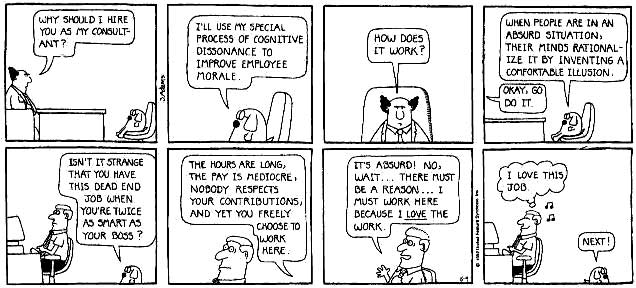April 20, 2017 at 6:38 am, by Carl
Once again, as the semester come to an end, there begins a parade of students who just now realize one of two things: (A) that they are doing poorly in the class or, perhaps worse, (B) that they have no idea how they are doing…but they believe it to be bad. It isn’t always bad…sometimes I have to remind a student that they have a passing grade, sometimes even a B (above average) grade, and that they shouldn’t quit.
Usually, though, what happens is a conversation in which part of what has to happen is to get the student to be honest with themselves. Often, they have done the self-protective thing that many of us do…they lie to themselves. That self-deception is more officially known in psychology circles as cognitive dissonance. Or, as Scott Adams explained in Dilbert, “when people are in an absurd situation, their minds rationalize it by inventing a comfortable illusion.”
They lie to self.
I’m pretty sure we all do it, at one time or another. It helps us navigate through life, especially if we begin to believe that our life has not turned out in the positive way we wish.
However, ultimately, such self-deception is harmful, and to move ahead in life we have to be honest with self. With a recent student, this person came in asking about the grade. They mentioned getting a 0 on a major graded work, so I checked only to find out that the project had been graded about 45-50 days prior to this meeting. When I mentioned that and why hadn’t they asked me previously, the student mentioned that they had not checked the grade. Now, I am certain the student had told themself that “I do care about this class.” Yet, I had to gently get this person to see that by not even checking on a graded thing, certainly within the week after being told it was graded, was clear evidence that they class simply was not high on the priority list. The student in fact did not truly care about the grade, or the quality of the work.
Now, that doesn’t mean the student is merely “a slacker” or a “loser who doesn’t give a rip about life.” There are multiple reasons why we engage in self-deception, often to protect ourselves. Many times, with something like an academic class, we may remember that we’ve done poorly previously and then are afraid we’ll fail again. So, if we don’t look at the grade, then we won’t have to deal with it. Yet, by not being honest with self, we run the risk of minimizing or even eliminating (as this student had) opportunities to salvage the situation.
You want to Live Well. So do I. In school, at work, in all of life, we are better served by being honest, being candid with self. It is usually not as bad as we imagine. Yet, if it is bad (and sometimes it is….a major situation has unfolded that cannot simply or easily be navigated), we begin the real process of healing, of moving forward, by being honest with ourselves.














Leave a Reply
Inappropriate or irrelevant comments will be removed at an admin's discretion.